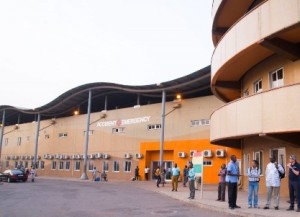Komfo Anokye Teaching Hospital to provide hostel for patients’ relatives

People taking care of sick relatives admitted at the Komfo Anokye Teaching Hospital (KATH), will soon heave a sigh of relief as the management of the second largest referral facility makes moves to provide decent accommodation.
Under a Public-Private Partnership (PPP) arrangement, the construction of a three-storey 134-bed hostel facility, is currently ongoing at the facility which takes care of referred cases from the whole of the Northern sector and neighbouring Burkina Faso, Mali, La Cote d’ Ivoire and Togo.
Dr. Joseph, Akpaloo, the Chief executive Officer (CEO) of KATH who made this known to the Ghana News Agency on the sidelines of a media interaction in Kumasi on Tuesday, said the lack of decent accommodation for relatives providing care to in-patients, has been a nagging challenge.
The project which he termed as a ‘mixed development venture’ has been designed to have facilities for the banks and other commercial entities on the ground floor, an affordable decent hostel with bunk beds for the ordinary people on the second floor, while the third floor would be executive suites for the well-to-do.
The CEO who stopped short at giving the total cost of the project, said the goal is to help subsidize charges for the not-so-rich clients, to be able to pay the fees.
He said it is a pathetic sight to see such people with their luggage and babies exposed to the vagaries of the weather and mosquitoes as they sleep in the open spaces at the hospital.
“What an irony that those taking care of sick relatives also get sick by the time those they are looking after, get better!”
Dr. Akpaloo said it was refreshing that the situation which is creating sanitation problems and affecting the scenic beauty of the hospital, would be a thing of the past when the project is completed next year.
He was however not happy about the ever increasing numbers of paupers who cannot pay for the services they access at the hospital and said the facility sets aside a huge portion of its budget to pay for their medical costs and feeding.
Source: GNA
